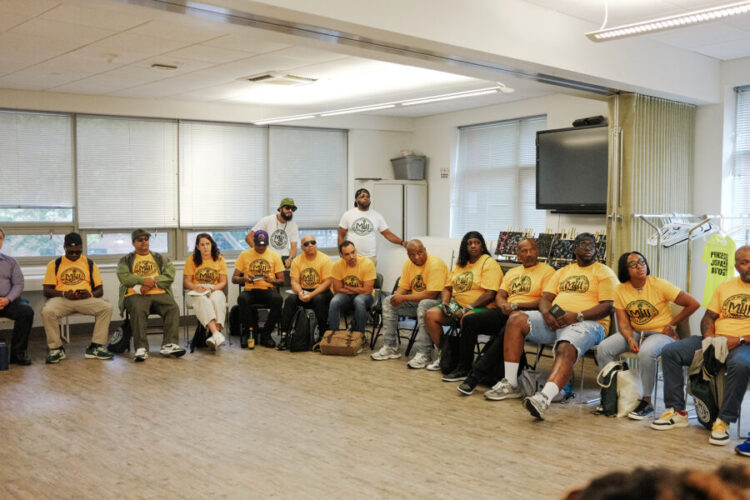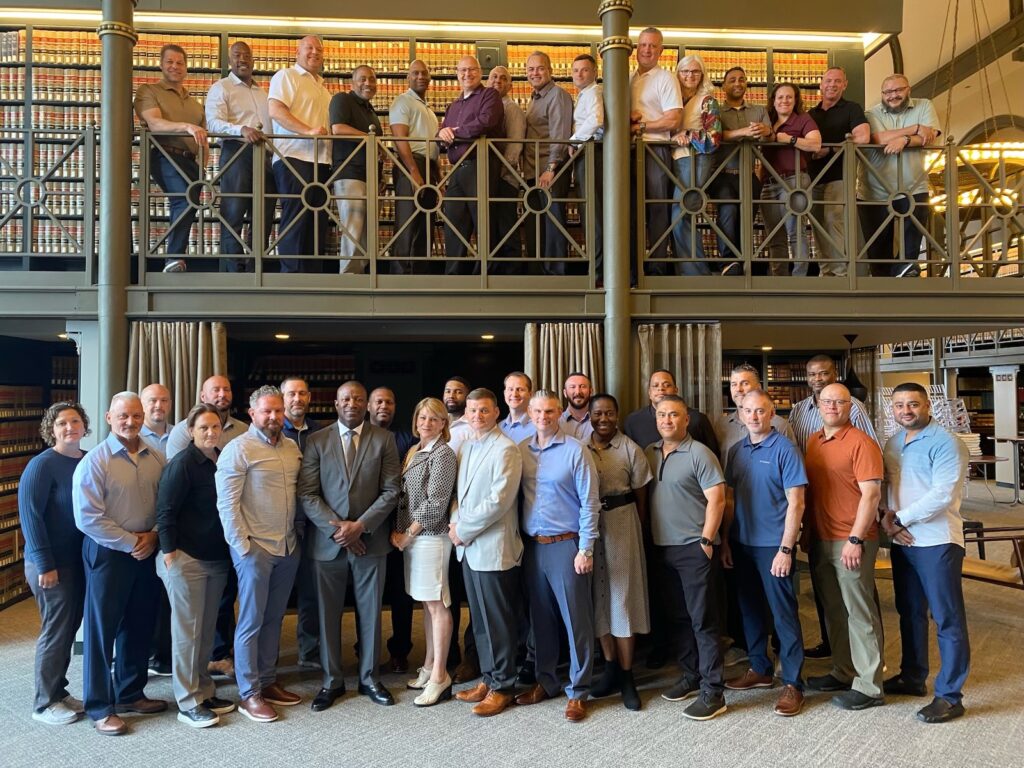Recognition of the Community Safety Leadership Academies
The community violence intervention (CVI) field has long been driven by survivors, concerned parents, and dedicated community members, often motivated by sheer love and concern and frequently funding their efforts out of their own pockets, with little institutional backing.

The Crime Lab’s Community Violence Intervention Leadership Academy (CVILA) represents a game-changing shift: not only are participants gaining MBA-level expertise from the University of Chicago at no cost, but they’re also receiving unprecedented institutional support at the highest levels.
This includes a potential federal investment, a visit to the White House, and a high-profile reception in New York City with Mayor Eric Adams – clear signals that this critical work is finally getting the recognition and support it deserves.

Federal funding to support the Crime Lab
Senator Dick Durbin has recommended including the Crime Lab’s Community Violence Intervention Leadership Academy (CVILA) and the Policing Leadership Academy (PLA) as priorities in the Senate Appropriations Committee Spending Bills.
Durbin is proposing a $600,000 investment in the CVILA and PLA, which are focused on violence prevention and reduction and building community trust.
The news comes after Senator Durbin visited our CVILA students earlier this summer and delivered remarks at the PLA graduation in May.
Read the senator’s press release
CVILA in Washington, D.C.
This week, the CVILA cohort returned to the White House. The second cohort, which is currently in session, met with the Office of Gun Violence Prevention (OGVP) to uplift and discuss their work.The first cohort graduated at the White House in a ceremony hosted by Vice President Harris in February. OGVP representatives and leaders from philanthropy addressed the group. While in D.C., the cohort also met with senior officials at the Department of Justice to discuss federal investments in violence prevention.

CVILA in New York City
For a recent immersion lab, the CVILA cohort was in New York City to focus on building healthy communities. The week started with a welcome reception at Gracie Mansion hosted by Mayor Eric Adams and Man Up! Inc.

CVILA application window now open
The Crime Lab’s Community Violence Intervention Leadership Academy is now accepting applications for its December 2024 and July 2025 cohorts. If you or someone you know would like to be considered, please apply or send referral notices by Friday, August 30.
Introducing the third cohort of the Policing Leadership Academy
We are proud to introduce the third cohort of the Crime Lab’s Policing Leadership Academy. The cohort recently gathered in Chicago to explore the theme of transformational leadership.
Over the next 5 months, the 35 participants will engage in hands-on training focused on data-driven management, violence reduction, and community trust.

PLA capstone projects driving impact
We caught up with two of the inaugural graduates of the Policing Leadership Academy, Captain Stephanie Drescher (Madison, WI) and Captain Sammy Shaffer (Knoxville, TN), to hear more about how the PLA experience shaped their work back home.
Read more about how they are putting their PLA capstone projects into action:
- Captain Drescher: Addressing Data Challenges to Prevent Domestic Homicide
- Captain Shaffer: Improving the quality of life in downtown Knoxville
Hear from three PLA graduates about their experience with the academy.
New research study- Improving Programming in Juvenile Detention: The Impact of Project Safe Neighborhoods Youth Outreach Forums
A growing body of evidence suggests focused deterrence strategies successfully reduce youth involvement in violent crime. Very little of this evidence comes from randomized experiments. Crime Lab affiliate Jonathan Davis takes a step toward filling this gap in the literature. The authors’ evaluation found the program caused a 20 percent reduction in the number of new spells at Cook County’s Juvenile Temporary Detention Center in the eight months after random assignment and reduced total arrests by 18 percent in the first year after random assignment.
Crime Lab in the news
- ABC News: “Machine-gun conversion device dubbed ‘Glock switches’ taking violence to the ‘next level’: Experts”
- Bloomberg: “Chicago CEOs Raise $100 Million to Fight Crime After Bloody Days”
- The Chautauquan Daily: “CVI director Chico Tillmon, leading voice in violence intervention, talks work in communities”
- Economics Applied (podcast): “Can We Predict Police Misconduct?”
- Dagens Nyheter (Sweden): “Expert: ‘Behavioral economics can stop the shootings’”
